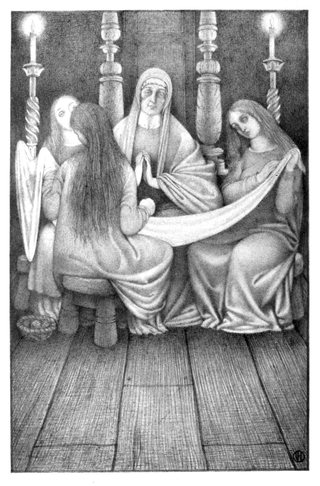Related Research Articles

A changeling, also historically referred to as an auf or oaf, is a human-like creature found throughout much of European folklore. A changeling was a substitute left by a supernatural being when kidnapping a human being. Sometimes the changeling was a 'stock', more often the changeling was a supernatural being made magically to look like the kidnapped human.

Sam McCall is a fictional character from General Hospital, an American soap opera on the ABC network. Created by Charles Pratt, Jr. and Robert Guza, Jr., the character made her debut on the episode airing on October 1, 2003, portrayed by Kelly Monaco. Sam is the daughter of mob boss Julian Jerome and attorney Alexis Davis, born and placed for adoption when both were teenagers. She arrived in town as a con artist trying to reverse her family's bad luck by destroying the five lucky cards of the "Dead Man's Hand." Upon her arrival, she was characterized as a "sexy bad girl, with a nose for intrigue." Since her introduction, the character has matured into a self-assured and confident woman, while still retaining traces of her adventuresome, bad girl ways.
"The Elfin Knight" is a traditional Scottish folk ballad of which there are many versions, all dealing with supernatural occurrences, and the commission to perform impossible tasks. The ballad has been collected in different parts of England, Scotland, Ireland, the US, and Canada. As is the case with most traditional folk songs, there have been countless completely different versions recorded of the same ballad. The first broadside version was printed before 1674, and the roots of the song may be considerably older.

"The Two Sisters" is a traditional murder ballad, dating at least as far back as the mid 17th century. The song recounts the tale of a girl drowned by her jealous sister. At least 21 English variants exist under several names, including "Minnorie" or "Binnorie", "The Cruel Sister", "The Wind and Rain", "Dreadful Wind and Rain", "The Bonny Swans" and the "Bonnie Bows of London". The ballad was collected by renowned folklorist Francis J. Child as Child Ballad 10 and is also listed in the Roud Folk Song Index. Whilst the song is thought to originate somewhere around England or Scotland, extremely similar songs have been found throughout Europe, particularly in Scandinavia.

"Hind Horn" is a traditional English and Scottish folk ballad.
Fair Annie is a traditional folk ballad, existing in several variants.

"Lord Thomas and Fair Annet", also known as "Lord Thomas and Fair Eleanor", is an English folk ballad.
The Laird O Logie or The Laird Of Logie is a traditional English-language folk ballad.
"The Lass of Roch Royal" is an English-language folk song, existing in several variants.
Vesle Åse Gåsepike is a Norwegian fairy tale collected by Peter Christen Asbjørnsen and Jørgen Moe in Norske Folkeeventyr. It has also been translated as Little Lucy Goosey Girl, and classified as Aarne-Thompson tale type 870A, "The Goose-Girl as Suitor".
The Bent Sae Brown is an English-language folk song.

Fause Foodrage is a Scottish murder ballad of the 17th or 18th century. It was first printed by Walter Scott in Minstrelsy of the Scottish Border (1802). Scott cited Elizabeth, Lady Wardlaw as the ballad's probable author.
Fair Janet is an English-language folk ballad.
"Gil Brenton" is an English-language folk song, existing in several variants.

"Andrew Lammie", also known as Mill o' Tifty or Mill o' Tifty's Annie, is a traditional Scottish ballad, set in Aberdeenshire, and catalogued as Child ballad 233. It tells the story of an ill-fated romance between Annie, the daughter of the miller at Tifty, and Andrew Lammie, the trumpeter for the lord of nearby Fyvie Castle. The romance is thwarted by Annie's ambitious family, who disapprove of the trumpeter's low rank. In most versions, the ballad ends with Annie's death at the hands of her brother.
Fair Mary of Wallington or Fair Lady of Wallington is a tradtional English-language folk ballad. Francis James Child lists at least seven variants of the ballad. The first variant is titled "Fair Mary of Wallington", while another variant is titled "The Bonny Early of Livingston".
The Bonny Lass of Anglesey is a traditional English-language folk song.
"The King's Dochter Lady Jean", also called "The King's Daughter," "Fair Rosie Ann," or "Queen Jane", is an English-language folk song.
"Bonnie Annie" is a folk ballad recorded from the Scottish and English traditions. Scottish texts are often called Bonnie Annie or The Green Banks of Yarrow, English texts are most often called The Banks of Green Willow. Other titles include The Undutiful Daughter, The High Banks O Yarrow, The Watery Grave, Green Willow, There Was a Rich Merchant that Lived in Strathdinah and The Merchant's Daughter.

Rickshaw Mama is a 1992 Indian Tamil-language film directed by P. Vasu. The film stars Sathyaraj, Gouthami and Khushbu. It was released on 15 January 1992, and completed a 100-day run.
References
- ↑ "Child's Ballads/222" . Retrieved 13 February 2012.